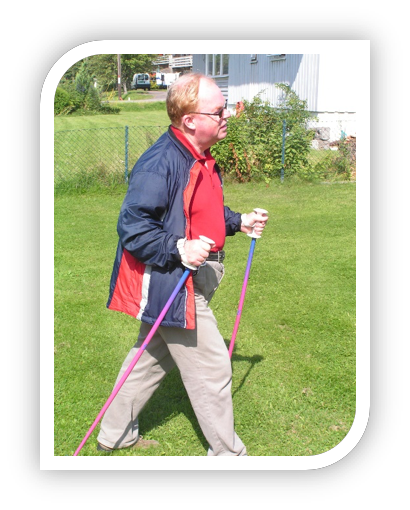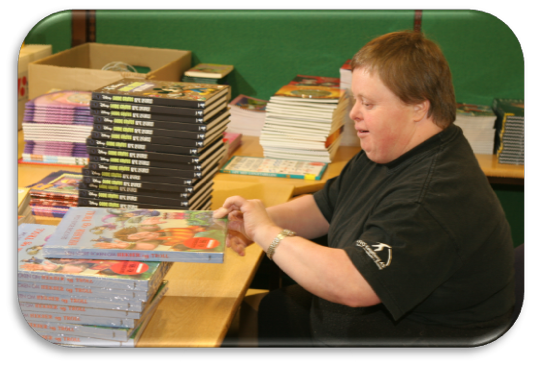Ageing
2. Ageing process
2.4. Successful ageing
Several people with ID do not know how to take care of themselves in a good way; they lack knowledge and ideas of how to do that. Several older adults depend on others for to be active, and sometimes family, siblings and staff do not have time being active together with them. The biggest threat to a successful ageing process is inactivity.
As a preventive measure 30 minutes or more of moderately intensive physical activity at most, preferably every day, is recommended for all adults. However, not every old adult with ID is fit enough to be engaged in moderately intensive physical activities (e.g. cerebral palsy). Some may be seriously hindered by medical conditions.
 Photo: Lars Aage Hynne
Photo: Lars Aage Hynne
Parent’s age and ageing process influences their children. Parents’ retirement, sickness, death, relocation (to nursing homes) affect stability and choices. 'Unnatural addiction' to parents or other people affects the possibility of personal development and choice in children's own lives.
Retirement is a transition to a new phase of life. With increasing age and decrease of functions, it may be challenging to work the same way as before. It is important that the person should not feel this as a defeat. An individual plan for less working days or less hours every day is important.
Even if retirement offers time to do a multitude of daily activities and leisure activities that seem meaningful, many people with ID desire to work after retirement age. Some retirees even want to go back to work because they feel social isolated.
Everyone is different. It is always important to talk about ageing and retirement with the person in question. One conversation about ageing and retirement with Anne Marie, 59 years old, was like this:
Now, I will ask you about how getting older feels for you? What do you think of being old?
- I do not know yet, I ...
You do not feel like you are already old?
- No... I am not old, I
You do not feel like you have changed
- No - but in three years I will be 60 years old
How do you think Anne Marie will be retired?
- No, if you think it is up to me. I do not want to...
You want what you have today
- Yes, like now - and at the workplace
It's possible to be there if you are retired too – is it at the age of 62 or 64?
- 63 I heard... I am just sewing, you know
So you feel old?
- No
(9:162)

Photo: Jørn Grønlund
One tool that may be useful in conversation that also describes a kind of plan, is My days as old. This is an easy-to-read plan that anyone with ID, eventually with help from others, can use to describe their own thoughts and wishes after retirement.
The consequence of current research involves turning from a one-sided focus on the causes and effects of disabilities and diseases to more focus on individual characteristics of a good life; to live with the plagues and recognise the situation with disability and illness as well as good relationships, networks and the feeling of being appreciated and valuable. Persons with a positive focus on life live much longer than others do.
Factors that affect a positive life setting are the experience of managing your own life, self-insight, personality and relationships. People’s attitude determines the quality of life and life span to a greater extent than welfare and good health (10). Close relationships builds immune systems and preventive strategies for health (11).
According to science, the following factors are important for successful ageing (8):
- To be engaged in your own life and the society
- Learn new things
- Protect brain and heart by good choices
- Master stress
- Stretch and bend, build the body strong, work out balance, coordination
- Stimulate all senses e.g. dancing and listening to music
- Imagine you are young
- Have fun
- Learn from life (life story work)
- Find inner peace
- Be familiar with and live for your own values
- Find the love of life
ACTIVITIES:
- Read the list of successful ageing and connect this to your child/sibling/client situation, preferably talk about what you think they can change to get a better life?
- Find three of the most important factors for successful ageing you think your child/sibling/client will benefit from changing
- Find out together how these changes can be part of everyday life for your child/sibling/client - and perhaps for the whole family